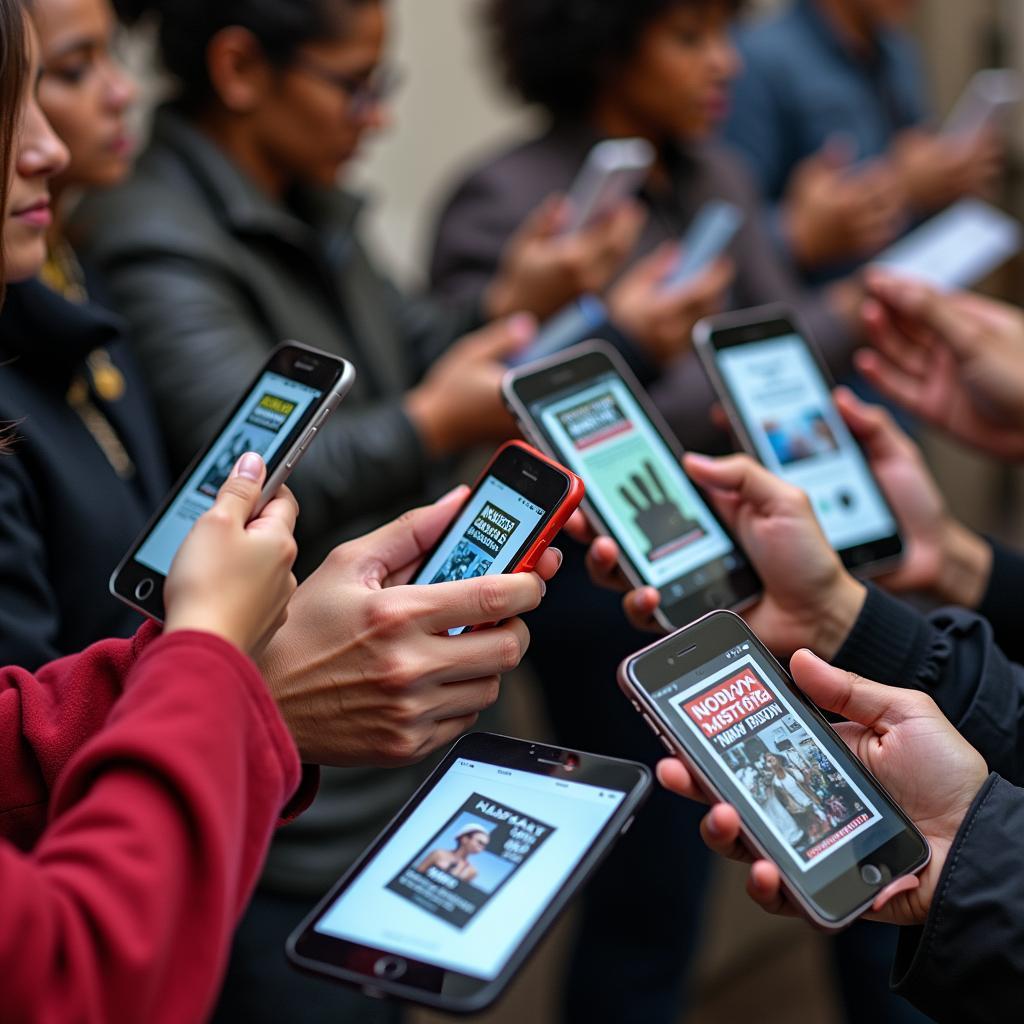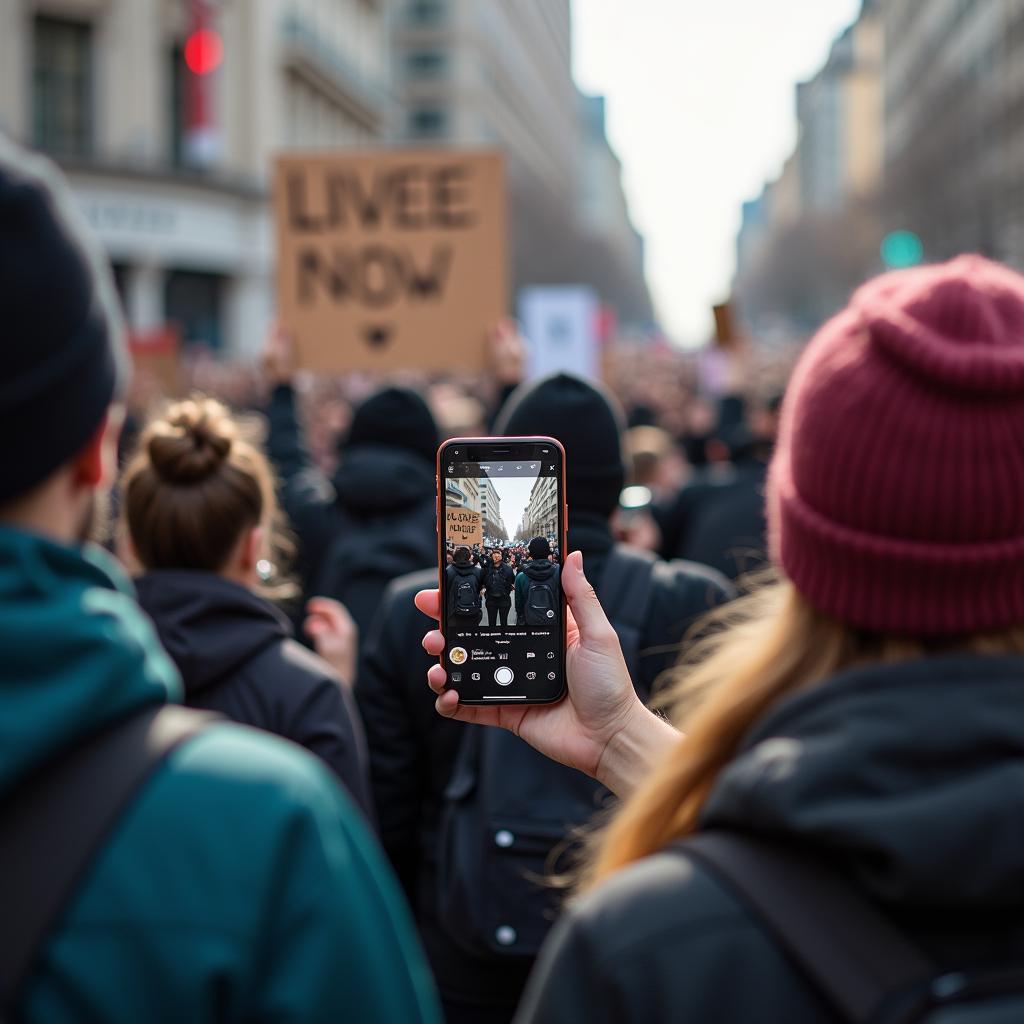Social media’s impact on social justice movements has become an increasingly common topic in IELTS Writing Task 2, appearing in various forms since 2019. Based on analysis of past exam questions and current trends, this theme is likely to remain relevant given its significance in contemporary society. Similar to The role of media in shaping opinions, this topic tests candidates’ ability to discuss complex social phenomena.
Table Of Contents
Let’s examine a recent IELTS Writing Task 2 question:
Some people believe that social media platforms have helped advance social justice causes, while others argue they have created more division in society. Discuss both views and give your own opinion.
Question Analysis
This question requires:
- Discussion of both positive and negative impacts
- A clear personal stance
- Balanced analysis of social media’s role in social justice movements
 Social media platforms role in modern social justice movements
Social media platforms role in modern social justice movements
Sample Essay 1 (Band 8.5)
Social media platforms have fundamentally transformed how social justice movements organize and spread their message, sparking debate about whether these digital tools unite or divide society. While these platforms have undoubtedly amplified marginalized voices, I believe their overall impact on social justice has been largely positive despite some drawbacks.
Similar to Strategies for promoting racial equality, social media has democratized activism by providing unprecedented reach and accessibility. Movements like Black Lives Matter and #MeToo gained global momentum through hashtags and viral content, enabling rapid mobilization and awareness-raising that traditional media channels could not match. Moreover, these platforms have created digital communities where marginalized groups can share experiences and organize collective action effectively.
However, critics argue that social media can exacerbate social divisions. Echo chambers and algorithmic bias can reinforce existing prejudices, while the anonymity of online spaces sometimes leads to hostile discourse that undermines constructive dialogue. Additionally, the oversimplification of complex social issues into shareable content may prevent nuanced understanding of systemic inequalities.
Nevertheless, I contend that social media’s benefits for social justice outweigh its shortcomings. The democratization of information and ability to rapidly mobilize support have proven crucial for modern activism. While platforms should address issues like misinformation and toxic behavior, their role in advancing social justice causes remains invaluable.
 Digital activism's influence on social change movements
Digital activism's influence on social change movements
Sample Essay 2 (Band 6.5)
Social media has changed how people fight for social justice. Some people think it helps make society better, but others say it makes people argue more. I will discuss both sides and give my opinion.
On the positive side, social media helps spread information about important issues. When something unfair happens, people can share it quickly, and many people can see it. This helps make changes happen faster. For example, many protests get organized on social media, and people can join easily.
However, there are also problems with social media and social justice. Sometimes people fight online and say mean things. Also, fake news can spread quickly and make people angry. Some people only follow others who think the same way, which doesn’t help them understand different opinions.
In my opinion, social media is mostly good for social justice. Even though there are some problems, it helps more people learn about important issues and take action. Just like effectiveness of universal basic income in reducing poverty, we need to focus on the positive changes it can bring.
Analysis of Band Scores
Band 8.5 Essay Analysis:
- Sophisticated vocabulary and complex structures
- Clear organization with cohesive devices
- Well-developed arguments with specific examples
- Balanced discussion with clear position
- Academic tone throughout
Band 6.5 Essay Analysis:
- Simple but clear vocabulary
- Basic paragraph structure
- Some development of ideas
- Less sophisticated examples
- More informal tone
Key Vocabulary
- marginalized (adj.) /ˈmɑːdʒɪnəlaɪzd/ – excluded from society
- exacerbate (v.) /ɪɡˈzæsəbeɪt/ – make worse
- democratization (n.) /dɪˌmɒkrətaɪˈzeɪʃən/ – making something accessible to everyone
- systemic (adj.) /sɪˈstemɪk/ – affecting an entire system
- mobilize (v.) /ˈməʊbəlaɪz/ – organize people/resources for action
For practice, try writing your own essay on this topic and share it in the comments. Similar topics might include social media’s role in political movements or digital activism’s effectiveness in creating real-world change.


